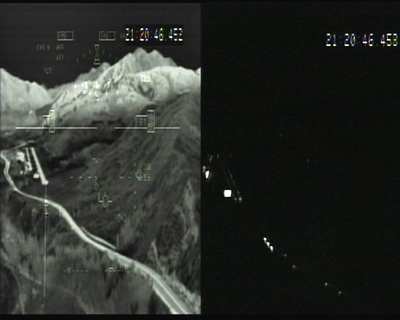Mon, Mar 21, 2005
Demand for Enhanced Vision System Remains Strong
 Gulfstream Aerospace tells ANN that
they have now retrofit 101 Gulfstream business aircraft with the
Gulfstream Enhanced Vision System (EVS). By the end of last year,
43 large-cabin, ultra-long-range G550 aircraft have been delivered
with EVS. Gulfstream also has installed EVS on a total of six
developmental aircraft used in the company's G550 and G450 flight
test programs.
Gulfstream Aerospace tells ANN that
they have now retrofit 101 Gulfstream business aircraft with the
Gulfstream Enhanced Vision System (EVS). By the end of last year,
43 large-cabin, ultra-long-range G550 aircraft have been delivered
with EVS. Gulfstream also has installed EVS on a total of six
developmental aircraft used in the company's G550 and G450 flight
test programs.
Since the first EVS was installed on an in-service Air Force
C-37A aircraft in May 2002, Gulfstream has installed another 60 in
the large-cabin, ultra-long-range GV; 20 in the large-cabin,
long-range GIV-SP; 16 in the large-cabin, long-range G400; and 4 in
the large-cabin, mid-range G300 aircraft. "C-37A" is the Air Force
designation for the ultra-long-range Gulfstream V business jet.

Early last year, the FAA validated the safety benefits of the
Gulfstream EVS in a Part 91 rule change that allows pilots to use
"enhanced flight visibility systems" to determine flight
visibility. The landmark regulation acknowledges that certain
enhanced vision systems are adequate for the pilot to "see" down to
an altitude of 100 feet above the elevation of the runway's
touchdown zone. Later in the year, the FAA bestowed to Gulfstream
one of two 2004 "Excellence in Aviation Research" awards for the
development of the Gulfstream EVS.
Like the G550, Gulfstream's newest large-cabin, long-range
business jet, the long-range G450 also will include EVS as standard
equipment when it begins customer deliveries in the second quarter
of this year. EVS is available as optional equipment on new
large-cabin, ultra-long-range G500 and large-cabin, mid-range G350
aircraft. EVS also is available as a retrofit on the large-cabin,
long-range G400 and large-cabin, mid-range G300 aircraft.

Certified by the Federal Aviation Administration Sept. 14, 2001,
Gulfstream EVS was developed in cooperation with Kollsman Inc. The
system incorporates a specially designed forward-looking infrared
(FLIR) camera that projects an infrared real-world image on the
pilot's Honeywell Head-Up Display (HUD). The Gulfstream EVS also is
the only certified system that features a cryogenically cooled
detector, which provides an unmatched level of sensitivity in
identifying runway lights during approach. EVS, which addresses
many of the issues raised in the FAA's Safer Skies Agenda, enables
the flight crew to see runway markings, taxiways, adjacent roads
and surrounding areas in conditions of limited visibility. The
system also helps crews avoid runway incursion and hazards that
would otherwise not be easily visible.
More News
Terminal Radar Service Area Airspace surrounding designated airports wherein ATC provides radar vectoring, sequencing, and separation on a full-time basis for all IFR and participa>[...]
Very High Frequency (VHF) The frequency band between 30 and 300 MHz. Portions of this band, 108 to 118 MHz, are used for certain NAVAIDs; 118 to 136 MHz are used for civil air/grou>[...]
“From approximately November 2021 through January 2022, Britton-Harr, acting on behalf of AeroVanti, entered into lease-purchase agreements for five Piaggio-manufactured airc>[...]
Also: Virtual FLRAA Prototype, IFR-Capable Autonomous A/C, NS-32 Crew, Golden Dome Missile Defense Bombardier announced that the first production Global 8000 successfully completed>[...]
Aero Linx: The 1-26 Association (Schweizer) The Association’s goal is to foster the helpfulness, the camaraderie, and the opportunity for head-to-head competition that is fou>[...]
 ANN's Daily Aero-Term (05.29.25): Terminal Radar Service Area
ANN's Daily Aero-Term (05.29.25): Terminal Radar Service Area ANN's Daily Aero-Term (05.30.25): Very High Frequency (VHF)
ANN's Daily Aero-Term (05.30.25): Very High Frequency (VHF) Aero-News: Quote of the Day (05.30.25)
Aero-News: Quote of the Day (05.30.25) Airborne 05.23.25: Global 8000, Qatar B747 Accepted, Aviation Merit Badge
Airborne 05.23.25: Global 8000, Qatar B747 Accepted, Aviation Merit Badge ANN's Daily Aero-Linx (05.30.25)
ANN's Daily Aero-Linx (05.30.25)





